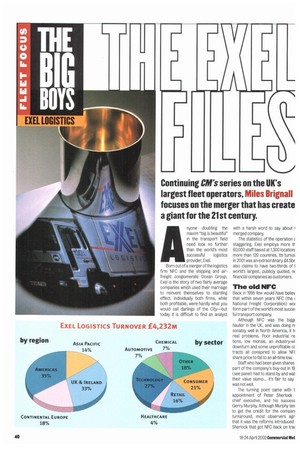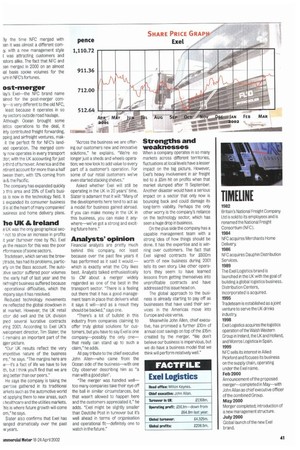nyone doubling the maxim "big is beautiful" in the transport
Page 40

Page 41

If you've noticed an error in this article please click here to report it so we can fix it.
field need look no further than the world's most successful logistics provider, Exel.
Born out of a merger of the logistics firm NFC and the shipping and airfreight conglomerate Ocean Group, Exel is the story of two fairly average companies which used their marriage to reinvent themselves to startling effect. Individually both firms, while both profitable, were hardly what you would call darlings of the City—but today it is difficult to find an analyst with a harsh word to say about I merged company.
The statistics of the operation E staggering. Exel employs more th 60,000 staff based at 1,300 location: more than 120 countries. Its turno■ in 2001 was an extraordinary &1.5br also claims to have two-thirds of I world's largest, publicly quoted, ni financial companies as customers.
The old NFC
Back in 1995 few would have believ that within seven years NEC (the National Freight Corporation) woi form part of the world's most succe; ful transport company.
Although NEC was the biggE haulier in the UK, and was doing rc sonably well in North America, it h real problems. Poor industrial re tions, low morale, an industry-wi downturn and some unprofitable cc tracts all conspired to allow NF( share price to fall to an all-time low.
Staff who had been given shares part of the company's buy-out in 19 (see panel) had to stand by and wat their value slump... it's fair to say was not well.
The turning point came with t appointment of Peter Sherlock chief executive, and his success Gerry Murphy. Although Murphy ten to get the credit for the compan; turnaround, most observers agr that it was the reforms introduced Sherlock that got NEC back on trai 3y the time NEC merged with tan it was almost a different corny, with a new management style t was attracting customers and :stors alike. The fact that NEC and tan merged in 2000 on an almost al basis spoke volumes for the urn in NFC's fortunes.
ost-merger
lay's Exel—the NEC brand name ained for the post-merger comiy—is very different to the old NEC, least because it operates in so ny sectors outside road haulage. Although Ocean brought some istics operations to the deal, it inly contributed freight forwarding, pping and airfreight ventures, makit the perfect fit for NEC's land5ed operation. The merged corny now operates in every transport ;tor, with the UK accounting for just 3-third of turnover. America and the ntinent account for more than a half tween them, with 12% coming from a & the Pacific.
The company has expanded quickly ) this area and 25% of Exel's busiss is now in the technology field. It s expanded its consumer business d is at the heart of many companies' )usiness and home delivery plans.
he UK & Ireland
e UK was the only geographical seenot to show an increase in profits 1 year (turnover rose by 1%). Exel ys the reason for this was the poor rformance of some sectors.
Tradeteam, which serves the brew; trade, has had its problems, particirly on the Bass account. The autoAive sector suffered poor volumes the early half of last year and the nkfreight business suffered because operational difficulties, which the ,mpany says it has resolved.
Reduced technology movements Ire reflected the global slowdown in at market. However, the UK retail .ctor did well and the UK division ;ned several lucrative contracts wing 2001. According to Exel UK's ivelopment director, Tim Slater, the remains an important part of the gger picture.
"Our UK results reflect the very impetitive nature of the business ire," he says. "The margins here are vi—it's a fact of life we have to live ith, but I think you'll find that we are )ing better than our peers."
He says the company is taking the cpertise gathered in its traditional arkets such as the automotive world id applying them to new areas, such ; healthcare and the utilities markets. his is where future growth will come om," he says.
Slater also confirms that Exel has langed dramatically over the past w years. "Across the business we are offering our customers new and innovative solutions," he explains. "We're no longer just a sheds and wheels operation; we now look to add value to every part of a customer's operation. For some of our retail customers we've even started stacking shelves."
Asked whether Exel will still be operating in the UK in 20 years' time, Slater is adamant that it will: "Many of the developments here tend to act as a model for business gained abroad. If you can make money in the UK in this business, you can make it anywhere—we've got a strong and exciting future here."
Analysts' opinion
Financial analysts are pretty much behind this company, not least because over the past few years it has performed as it said it would— which is exactly what the City likes best. Analysts talked enthusiastically to CM about a merger widely regarded as one of the best in the transport sector. "There is a feeling out there that it has a good management team in place that delivers what it says it will—and as a result they should be backed," says one.
"There's a lot of bullshit in this industry from companies claiming to offer truly global solutions for customers, but you have to say Exel is one company—possibly the only one— that really can stand up to such a claim," he adds.
All pay tribute to the chief executive John Allen—who came from the Ocean side of the business—with one City observer describing him as "a man with a good plan".
"The merger was handled well— too many companies take their eye off the ball in similar circumstances, but that wasn't allowed to happen here and the customers appreciated it," he adds. "Exel might be slightly smaller than Deutche Post in turnover but it's well ahead in terms of organisation and operational fit—definitely one to watch in the future."
Strengths and weaknesses
When a company operates in so many markets across different territories, fluctuations at local levels have a lesser impact on the big picture. However, Exel's heavy involvement in air freight led to a £5m hit on profits when that market slumped after 11 September. Another disaster would have a serious impact on a sector that only now is bouncing back and could damage its long-term viability. Perhaps the only other worry is the company's reliance on the technology sector, which has seen a huge drop in business.
On the plus side the company has a capable management team with a strong idea of how things should be done. It has the expertise and is winning over customers. The fact that Exel signed contracts for £600m worth of new business during 2001 tells its own story. Like other operators they seem to have learned lessons from getting themselves into unprofitable contracts and have addressed this issue head on.
The global approach to the business is already starting to pay off as businesses that have used their services in the Americas move into Europe and vice versa.
Meanwhile John Allen, chief executive, has promised a further 110m of annual cost savings on top of the 115m created by the merger. "We don't believe our business is impervious, but we do have a business model that we think will perform relatively well."




























































































































































